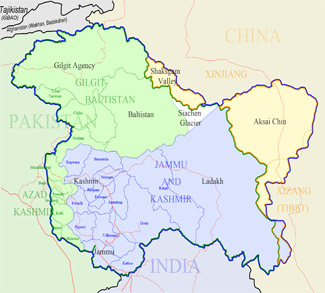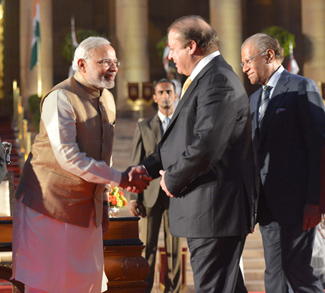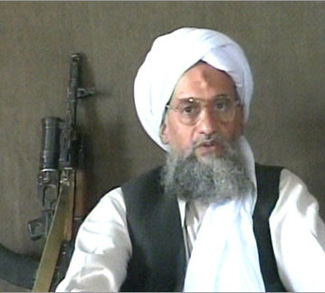Farooq Abdullah, as is his wont, has once again stirred the hornet’s nest. He says let Pakistan keep its part of the State and we keep ours.
Had things been that simple, Kashmir would not have earned the sobriquet of ‘Gordian knot’ nor would have Pakistan lost its eastern part. Pakistan would not have finally volunteered to become the Frankenstein of its terror devilry.
Farooq has won the wrath of “nationalists” of both countries. Yet his statement merits cool and unemotional appraisal. He may be a mad cap but he has a method in his madness.
In the past, India threw some hints that she would not be averse to a partition of Kashmir along the existing Line of Control (LoC). There were no takers of the idea in Pakistan.
In 1964, an embattled and disillusioned Nehru sent Shiekh Abdullah to Pakistan with the offer of Confederation (India, Pakistan, and Kashmir). General Ayub turned it down.
The six-month long Swarn Singh – Bhutto Kashmir talks broke down in the sixth round when Bhutto rejected his counterpart’s offer of dividing the valley with Wular Lake as the watershed.
Pakistan’s acceptance of the division of Kashmir along LoC has to come from the Pakistan army and not the civilian government. Why is the Pakistan army not reconciled to the formula? Let us try to understand.
A ceasefire in Kashmir was the joint plan of the Pak army and British intelligence agency. The British had attained the ulterior motive of Pakistan retaining control over Northern Areas.
The Anglo-American bloc looked rather askance at Nehru’s pseudo-socialism. This sucked Pakistan into the vortex, first the Baghdad Pact, and then SEATO and CENTO. India drifted towards the nebulous ‘non-aligned’ concept, voluntarily though unwittingly, making her stand on Kashmir tenuous. Clinching the Soviet bloc and simultaneously pontificating non-alignment was the great charade. The two newly independent countries, sucked into the ideological collision of the Cold War era, began distancing from each other. The Pakistan army found a godfather in the Pentagon.
The separation of Bangladesh from West Pakistan remains a living story of the Pak army’s utter disgrace. Surrounded by a pack of eccentric jokers in the name of advisers and foreign office policy planners, Indira Gandhi lost on the negotiating table in Shimla what she had gained on the ground. Destiny had made her pay for her father’s fantasia.
The Pak army has vowed to take revenge for its disgrace. Consequently, it does not allow civilian government to have any say on Kashmir, a policy stoutly supported by her western handlers.
The Pak army has strategic utility for the Anglo-American bloc even after the collapse of the Soviet Union. It protects the Saudi monarchy, which in turn, basks in the sunshine of American patronage. Therefore, the Anglo-American bloc has become the big benefactor of the Pakistan army, regularly refurbishing her war machine and making lavish offers of grants under one or the other head. With their close camaraderie with Pentagon moles, Pakistani generals, after their retirement, manage emigration to the U.S. with comparative ease.
It is the Pentagon that keeps the Kashmir pot boiling for Pakistan. The Pakistan army has made it a national issue by spreading enormous disinformation. Pakistan’s political leadership lacks the vision and statesmanship required for a country to pave its own path.
Additionally, the Pakistan army has paralyzed the civilian government in Islamabad by floating jihad brigades like LeT, JM, HuM and many others. LeT makes no secret of its Kashmir agenda. Kashmiris on our side of the LoC have succumbed to powerful anti-India diatribe of ISI. Hence Kashmir separatists are more loyal to ISI than the Pakistanis. In the formative days of Kashmir Liberation Front, Farooq and Amanullah Khan together held a Kalashnikov and raising it high from the platform of a public rally in PoK told people that ‘this’ would liberate Kashmir from Indian ‘stranglehold.’
With the Pakistan army having achieved success in alienating the Kashmir Muslim community from India, with fidayeen infiltrating from all vulnerable inlets and galvanizing local terrorist-fundamentalist chapters into attacks on army, BSF, and police establishments, Pakistan is in very comfortable position to dictate terms to India rather than succumb to India’s supplication for partition of Kashmir. Farooq knows it better than anybody else does.
The unanimous parliamentary resolution of 1994 is a paper tiger with no life and substance in it. That was a device initiated by late PM Narasimha Rao to obfuscate the Pakistan sponsored anti-India resolution on Kashmir at the Human Rights Commission in Geneva. It was part of Rao’s strategy of undermining the Pakistani resolution when he put the London-based Hinduja mega business house to placate Iran. The trick worked. Much water has flowed down the river since that event and the resolution has lost its teeth. Having the will and strength to take it back is one thing; adventuring in practice is another. Nuclear countries cannot and should not think along those lines.
At the same time, no political leader or party in Kashmir, in or out of power, ever moved a blade of grass to emphasize upon the masses of people in Kashmir that their interest and future lay in a democratic and secular India. Not only have they not, these parties, in or out of power, are harping on finding a political solution to Kashmir issue. In simple terms they want to convey to New Delhi that Kashmiri Muslims are not happy with the existing arrangement. Imagine how much strength Pakistan draws from this loose and dubious talk.
Today, Pakistan is far better convinced that India is on slippery grounds in Kashmir, land is with them not the people. Srinagar-Muzaffarabad bus service, LoC cross border trade, rehabilitation of lured Kashmiris back in Kashmir, breakdown in state administration and above all drastic radicalization of Kashmir Muslim society all have come together to make it very much unrealistic to expect Pakistan accepting division along LoC as the solution of the tangle.
Pragmatically speaking, Farooq is perfectly right in what he has said. But the question is will Pakistan accept it and stop her anti-India tirades? From the Indian point of view, legality of accession remains unassailable. Investment in Kashmir’s development is extraordinary especially in road and rail connectivity. Income per capita in J&K is the highest in the country. It is the only state in India where nobody goes to bed with an empty stomach. What cogent reason do Kashmiris have to remain alienated? Yet they are, and yet Farooq, Mufti and all other mainstream politicians want a “political solution of Kashmir” without ever proposing a single formula of that solution. Their repeated slogan of Kashmir as a political issue has one and only one purpose: convey to Pakistan not to settle for division of Kashmir.
Farooq is fully acquainted with this entire scenario. His contribution would be to take up the thread where his father had left it. He should proceed to Islamabad and engage Pakistani leaders, Generals, ISI musclemen, and above all Anglo-American policy planners to agree to the formula of what is with you is yours and what is with me is mine in Kashmir.
The opinions, beliefs, and viewpoints expressed by the authors are theirs alone and don’t reflect any official position of Geopoliticalmonitor.com.



